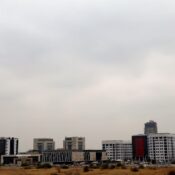
Kenya would allow duty-free imports from the EU once the trade agreement is implemented
After ten years of talks, Kenya and the EU have finally implemented a trade agreement, allowing tax-free goods from the 27-member union to enter the domestic market after 25 years.
The EU-Kenya Economic Partnership Agreement (EPA) went into effect on Monday, according to Kenya’s Cabinet Secretary for Investment, Trade, and Industry, Rebecca Miano. The agreement maintains unimpeded access for Kenyan commodities to the European Union, with the exception of weaponry.
In terms of advancing economic sustainability, the EU-Kenya EPA is one of the most ambitious accords ever signed between the EU and an African nation. Other African nations, especially those in Eastern Africa, could use it as a model to modify, according to a statement from Ms. Miano.
“The agreement covers provisions on labor issues, gender equality, forestry and environment, and the fight against climate change. It also includes trade, economic, and development cooperation.”
Kenya’s mostly agricultural products, including fruits, vegetables, cut flowers, tea, and coffee, will continue to be able to enter the EU market duty-and quota-free thanks to the agreement, which is the first trade agreement between the bloc and a developing nation.
Nairobi, on the other hand, has promised to liberalize trade after 25 years of gradually lowering import duties from Europe.
This implies that European Union investments would be encouraged and that items from Europe, including machinery and mineral and chemical products, will not be subject to duties.
Nonetheless, a protectionist language in the EPA agreement prevents the EU from providing broad subsidies for agricultural exports to Kenya unless there is a more in-depth policy discussion with Nairobi. With the help of this clause, Kenyan agriculture and food security will be protected against unfair competition from the EU.
The EU benefits from trade with Kenya, as it imports Ksh150.08 billion ($1.2 billion) and sells items worth Ksh223.12 billion ($1.7 billion) to Kenya.
Following the European Parliament’s approval on February 29, heads of state and government can now finalize the ratification procedure, bringing the EU-Kenya EPA into force.
A total of 366 EU legislators supported the agreement, 86 opposed it, and 56 abstained.
The document needed approval from Kenyan MPs in order to be put into effect.
The wording of the EU-East African Community agreement, which was previously signed in October 2014 and is currently blocked for approval by the individual parliaments, is extensively modified in this document. The introduction of provisions addressing climate change is the primary modification.
Following the other EAC nations’ rejection of the EU-EAC treaty, Kenya’s endorsement of it in 2016 caused its implementation to stall.
Tanzania and Uganda declined to accept the agreement due to a variety of political and economic reasons, including concerns over an influx of European products into the market. Rwanda signed the agreement but did not ratify it.
The “everything but arms” trade arrangement for least-developed countries protects the other EAC members from increasing export tariffs, in contrast to Kenya, a lower middle-income nation.
Because they are the least-developed nations (LDCs), they are entitled to special and differentiated treatment under the World Trade Organization (WTO).
Nairobi was forced to make a temporary special arrangement with the EU in response to the EAC peers’ failure to cooperate, which has allowed Kenyan products to continue entering EU markets duty- and quota-free.
However, bilateral trade agreements were permitted to be signed by partner members at the EAC Heads of State Summit in February 2021, provided that they provided flexibility for future EAC member nations to join.
Other EAC members are free to join at any time as Kenya and the EU have taken advantage of this opportunity to reengage on the agreement.
The revised document was finally signed in December of last year, pending confirmation by the relevant parliaments.
All Categories
Recent Posts
Tags
+13162306000
zoneyetu@yahoo.com



